Monitoring and Evaluation
Most M&E challenges, such as a lack of sufficient investment and capacities, are not specific to CVA. But those that are relate primarily to monitoring outcomes for unrestricted transfers. The flexibility of cash transfers can make it difficult to determine appropriate outcome indicators, as they may involve a combination of sector-specific and cross-cutting indicators. At the same time, there are limitations on gathering accurate data on how cash transfers are spent.
Grand Bargain signatories have committed to ensuring relevant M&E mechanisms are in place for cash, and increasing understanding of the costs, benefits, impacts and risks of cash relative to other modalities. Building on this, the GB cash workstream has action points including the development of common outcome indicators for multipurpose cash, and metrics for analysing value for money. Systematic value for money analysis has been limited by factors including a lack of agreed upon approaches, the need for quality outcome data, and the intensive nature of the analysis.
Current priorities
As part of the Grand Bargain cash commitments, the CALP Network has co-led (with USAID and CRS) the development of Multipurpose Cash Outcome Indicators. The draft for testing is currently available in English, French and Spanish via the library.
Related initiatives
Featured content

Multipurpose Cash Outcome Indicators – Final Draft for Testing
Guidelines and Tools
Note that the MPC indicators have now been revised. Please click here to access the updated Multipurpose Outcome Indicators and Guidance, which is available in Arabic, English, French and Spanish. Multipurpose Cash Outcome Indicators – Final Draft for Testing Multipurpose cash (MPC) is a type of assistance intended to enable people to meet their basic needs through local...

Monitoring 4 CTP: Monitoring Guidance for CTP in Emergencies
Guidelines and Tools
This guidance provides a central resource to promote a common understanding of the most important monitoring considerations for humanitarian projects using cash transfer programming (CTP). The primary audience for this guidance is field-level practitioners, from organisations directly involved in the design, implementation, monitoring, and accountability of projects using cash and vouchers...

Cost-Efficiency Analysis of Basic Needs Programs: Best Practice Guidance for Humanitarian Agencies
Guidelines and Tools
The Efficiency, Effectiveness and Value for Money Sub-Workstream is pleased to share the final output on Cost-Efficiency Analysis of Basic Needs Programs: Best Practice Guidance for Humanitarian Agencies (attached).
Cost-efficiency analysis estimates the ratio of program costs to outputs created, allowing you to compare cost-per-output for programs which all produced the same output. Such...
Thematic lead
Latest

Review of Food for Peace Market-Based Emergency Food Assistance Programs: Zimbabwe Case Study Report
Report
Zimbabwe reflects the recent Southern African drought crisis during a period of a regional El Niño-related drought and a national cash crisis. The United States Agency for International Development (USAID) Office of Food for Peace (FFP) funded a mix of programming between fiscal years 2011 and 2015,...

Hygiene NFI Provision through Cash Assistance with E-Voucher Modality: PDM
Report
NCA & LWF Gure-shembola Refugee Camp CBI PDM report.

Social Accountability in the Delivery of Social Protection: Technical Guidance Note
Guidelines and Tools
How can citizens better hold social protection officials to account and ensure that they can understand their entitlements? Development Pathways’ research project on social accountability in social protection for the UK’s Department for International Development provides some answers. Social...

Gure- Shembola Refugee camp E-vouchor pilot program- Learning Document
Report
Norwegian Church Aid (NCA) in partner with Lutheran World Federation (LWF) have been completed their project using CBI approach. The project was aimed to provide Gure Shembola refugees with access to their choice of hygiene items through an e-voucher system. This learning document aims to document the...
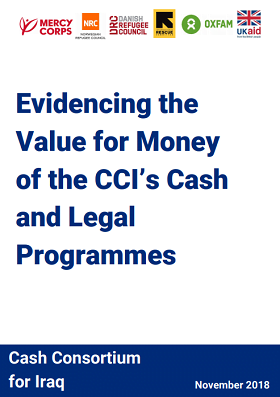
Evidencing the Value for Money of the CCI’s Cash and Legal Programmes
Report
Value for Money (VfM) considerations are an increasingly common requisite in humanitarian programmes. The UK’s Department for International Development (DFID) supports the adoption and scale-up of cash programming in humanitarian settings where appropriate, as both a more effective means for people to...
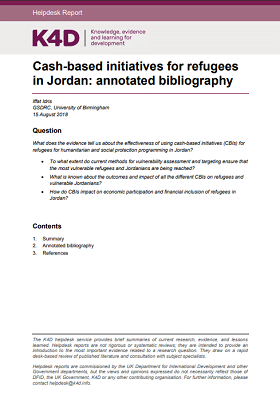
Cash-Based Initiatives for Refugees in Jordan: Annotated Bibliography
Report
The available literature tells us little about the effectiveness of targeting of cash-based initiatives (CBIs) for refugees in Jordan. However, it suggests there are positive impacts on food security for refugees, their ability to pay for rent and utilities and their psycho-social well-being, as well as...

Mainstreaming Gender-Based Violence Considerations in Cash-Based Interventions: A Case Study from Lower Juba, Somalia
Report
This case study provides an overview of assessment and monitoring activities
conducted by the Women’s Refugee Commission and Adeso to mainstream GBV considerations within Adeso’s CBI in Lower Juba.

Reviewing the Linkages between Gender, Market Assessments and Market-based Interventions
Report
From ‘Collected Papers on Gender and Cash Transfer Programmes in Humanitarian Contexts’. Existing gender inequalities mean that disasters and conflicts impact women, men, girls and boys differently. Cash based assistance is one of the most significant developments in humanitarian assistance in recent...

Cash-Based Programming in South Sudan
Report
This rapid review provides a synthesis of evaluations and learning reviews of cash-based programming in South Sudan. There is evidence that in South Sudan the cash-based programming help poor households address food needs and nutrition; and by injecting funds from vouchers, paid work, or grants into the...
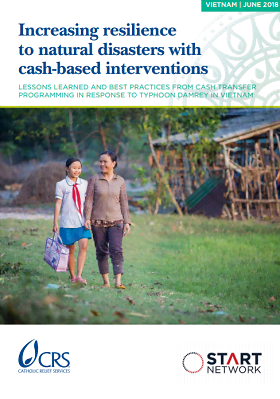
Increasing resilience to natural disasters with cash-based interventions
Report
This report presents recommendations for the ongoing development and improvement of CTP in emergency preparedness and response in Vietnam. It is hoped that these best practices, lessons learned and recommendations will contribute to the wider global discussions on the use and impact of CTP to increase...

The 1.5 Billion People Question : Food, Vouchers, or Cash Transfers?
Report
Most of the people in low and middle-income countries covered by social protection receive assistance in the form of in-kind food. The origin of such support is rooted in countries’ historical pursuit of three interconnected objectives, namely attaining self-sufficiency in food, managing domestic food...

Mainstreaming Gender-Based Violence Considerations in Cash-Based Interventions: A Case Study from Zinder, Niger
Report
This case study provides an overview of assessment and monitoring activities undertaken by the Women’s Refugee Commission and Save the Children to mainstream gender-based violence (GBV) considerations in Save the Children’s cash-based intervention (CBIs) in Zinder. Key findings, learning and...
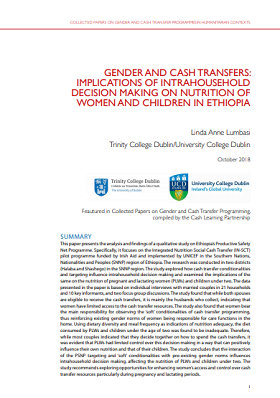
Gender and Cash Transfers: Implications of Intrahousehold Decision Making on Nutrition of Women and Children in Ethiopia
Case Study
From ‘Collected Papers on Gender and Cash Transfer Programmes in Humanitarian Contexts’. Existing gender inequalities mean that disasters and conflicts impact women, men, girls and boys differently. Cash-based assistance is one of the most significant developments in humanitarian assistance in recent...
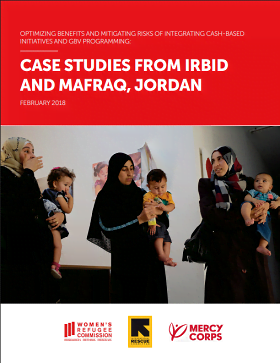
Optimizing Benefits and Mitigating Risks of Integrating Cash-Based Initiatives and GBV Programming: Case Studies from Irbid and Mafraq, Jordan
Report
This case study provides an overview of assessment and monitoring activities
conducted by Mercy Corps and the International Rescue Committee in partnership with the Women’s Commission to:
a. mainstream gender-based violence (GBV) considerations in cash-based interventions
b. utilize cash within a GBV...
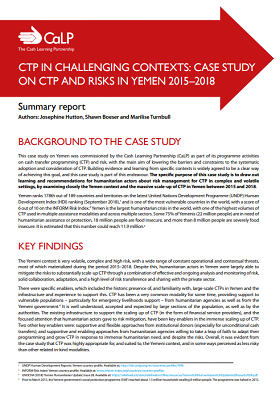
CTP in Challenging Contexts: Case Study on CTP and Risks in Yemen 2015–2018 – Summary
Report
Yemen is one of the most vulnerable countries in the world, and has long suffered from poverty, instability and vulnerability. The conflict, which has unravelled since late 2014, and, more specifically, since March 2015, has left 22 million Yemenis in need of some kind of humanitarian assistance or...
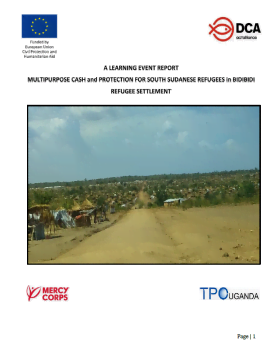
Multi-purpose Cash and Protection for South Sudanese Refugees in Bidibidi Refugee Settlement: A Learning Event Report
Report
This paper will present evidence on how cash transfers empowers conflict affected populations. The evidence is based on two projects implemented by DCA in Bidibidi Refugee Settlement in Uganda. Furthermore, the paper present evidence on how the two projects successfully linked cash and protection. 14, 520...

CTP in Challenging Contexts: Case Study on CTP and Risks in Yemen 2015–2018
Report
Yemen is one of the most vulnerable countries in the world, and has long suffered from poverty, instability and vulnerability. The conflict, which has unravelled since late 2014, and, more specifically, since March 2015, has left 22 million Yemenis in need of some kind of humanitarian assistance or...
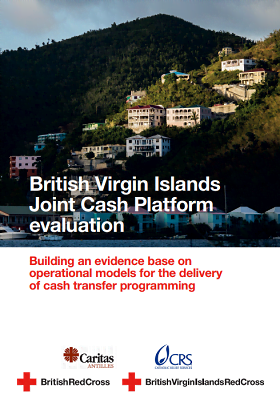
British Virgin Islands Joint Cash Platform Evaluation: Building an evidence base on operational models for the delivery of cash transfer programming
Report
The main aim of this evaluation is to map out and analyse aspects of the British Virgin Islands Joint Cash Platform (JCP) Operational Model (OM) influencing key drivers of MPG response quality analysing aspects of effectiveness, efficiency and accountability. The study methodology is based on the CALP...
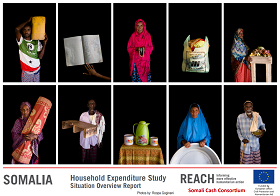
Somalia Household Expenditure Study
Report
To gain a better understanding of how recipients utilise cash transfers and prioritise spending needs, REACH, through the Somali Cash Consortium, conducted a study on the expenditure patterns of cash transfer beneficiaries.

British Virgin Islands Joint Cash Platform: Case study for learning on collaborative cash programmes
Report
The British Virgin Island (BVI) Joint Delivery Platform (JCP) is an effective model for learning around collaboration, developed at the onset of the humanitarian response, to deliver a small-scale emergency and early recovery cash based response, in a context without previous cash response experience. The...



